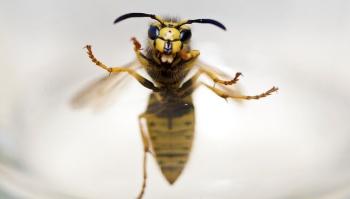Bee Stings
August 22, 2019

Here at Champlain Medical Urgent Care, we are starting to see multiple people coming in with bee stings. Bees usually become active in the spring with the warm weather and flowering plants and remain active throughout the summer and into the fall. Wasps can be especially more active in the summer when it’s warmer. Bees are not aggressive and only sting when they are threatened, such as if they are swatted at or stepped on. If you see a bee near you, you should not swat at it or move your arms around, but rather slowly back away. If there are a large number of bees swarming you or stinging you, cover your nose and mouth and go quickly into a building or vehicle. Bees can be attracted to sugary foods or drinks, so always check before bringing food or drink to your mouth if eating outside.
Most people who experience a bee sting will experience some sort of a local reaction, such as pain, redness, and swelling at the site of the sting. These symptoms usually resolve over hours to days and can often be treated with at-home remedies. If you do get stung by a bee, remove the stinger from your skin as quickly as possible. Wash the area gently with soap and water and apply a cool compress. You can take an over-the-counter anti-inflammatory (like Advil or Aleve) that can help with any discomfort and inflammation. If itching or swelling is bothersome, you can also take an anti-histamine (like Allegra, Claritin or Zyrtec). Products like hydrocortisone or calamine lotion may also help with itching. You should avoid scratching the area as this could worsen the itching and could lead to breaks in the skin that could lead to a possible infection.
Bee stings can cause an allergic reaction in some people. Severe allergic reactions are called anaphylaxis, which are medical emergencies that can even lead to death. Symptoms of an allergic reaction or anaphylaxis may include rash or hives, tongue/lip/face swelling, trouble breathing, wheezing, nausea, vomiting, diarrhea, or dizziness. You can get an allergic reaction even if it’s the first time you’ve been stung by a bee. If you are stung by multiple bees or have an allergic reaction, it is important that you seek emergency medical care immediately. Call 9-1-1 and go the hospital by ambulance (do not drive yourself or get a ride from someone if you are having an allergic reaction). If you have been prescribed epinephrine (like an EpiPen), you should also use it immediately.
If you have had any symptoms of an allergic reaction or anaphylaxis to bee stings, you should see an allergist for further testing and treatment. If testing shows that you are allergic to bees, it is possible that you can get anaphylaxis if you are ever stung again. Some people need to have allergy shots to reduce their chance of anaphylaxis in the future.
We are happy to further discuss bee stings and to treat you here at Champlain Medical Urgent care for your local reactions from bee stings. We are open Monday through Friday 8am to 6pm.